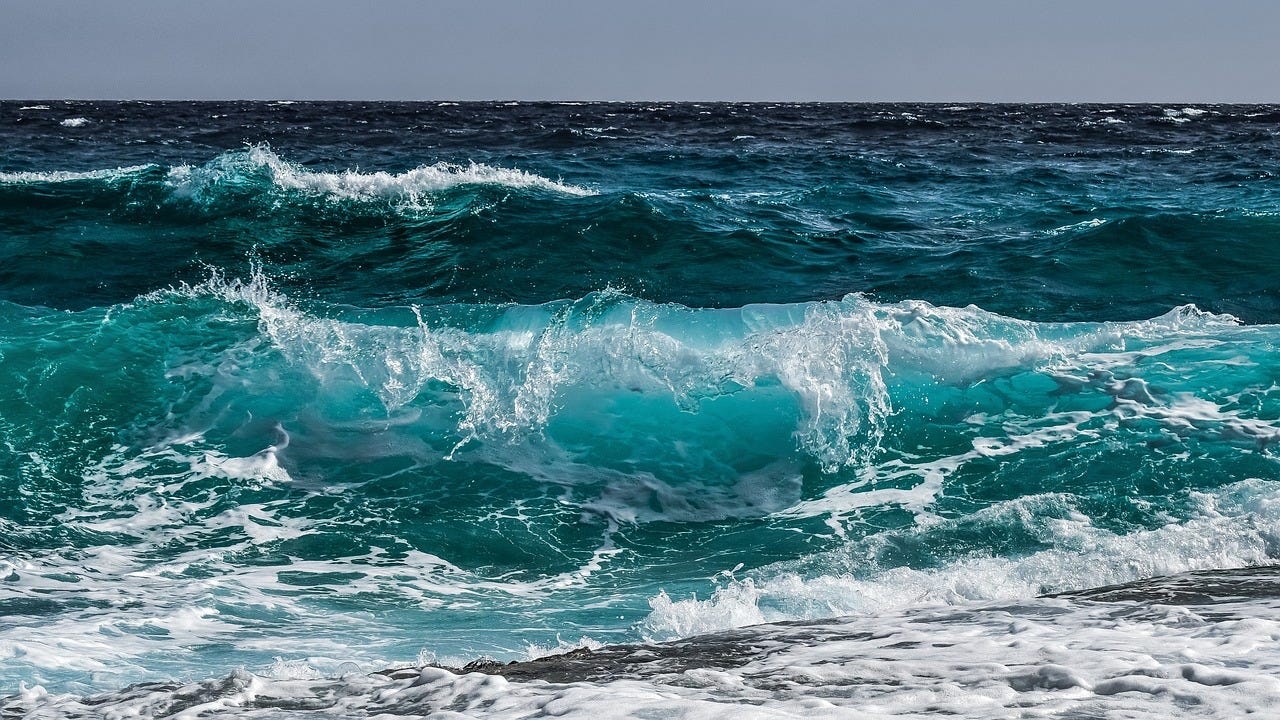News Round-Up: X Closes Operations in Brazil, Thought Crimes in the UK and Atlantic Ocean Cooling Fast
Every week, the editorial team of Freedom Research compiles a round-up of news that caught our eye, or what felt like under-reported aspects of news deserving more attention.
Over the past week, the following topics attracted our attention:
UK Police apologises to the woman arrested for silently praying near an abortion clinic.
The Atlantic Ocean is cooling at a record pace.
The British government releases prisoners: space made available for anti-immigration protesters.
X closes operations in Brazil due to censorship.
Thousands seek compensation after Covid vaccines left them disabled.
UK: Police apologises to the woman arrested for silently praying near an abortion clinic
Isabel Vaughan-Spruce, director of the anti-abortion group March for Life, demanded compensation from West Midlands Police for two wrongful arrests and false imprisonments, assault and battery in relation to an intrusive search of her person, and for a breach of her human rights in 2022 and 2023, reports Free Speech Union.
Vaughan-Spruce was first arrested in November 2022 while she was praying quietly in the so-called 'buffer zone' imposed by local authorities around an abortion clinic in the Kings Norton area of Birmingham. The zone had been introduced by the city council earlier that year. Under the decision, it is a criminal offence for any act of approval or disapproval of abortion to take place near a women's clinic. The offence is punishable by a fine of up to £1,000 (€1,174). In 2023, the country's parliament gave its approval for the introduction of such buffer zones around women's clinics. Within these zones, it is an offence, within 150 metres of an abortion services provider, to intentionally or recklessly: influence a decision to access or provide abortion services; impede or obstruct access to these services; and harass or intimidate a person while they access the provision of abortion services at an abortion clinic.
Vaughan-Spruce, who prayed in the zone, was charged with 'protesting and engaging in an act that is intimidating to service users'. However, she was acquitted by a Birmingham court in February 2023 because her alleged "thought crime" could not be proven.
A few weeks later, Vaughan-Spruce was arrested again for the same offence, and was now deemed by the police to have committed the crime of praying. After a six-month investigation, the charges were dropped and an apology was issued from police regarding the lengthy process. Vaughan-Spruce found that on both occasions she was arrested solely for the thoughts in her head. She also said that the culture in Britain is shifting towards a clampdown on viewpoint diversity, with Christian thought and prayer increasingly under threat of censorship. She received £13,000 (€15,259) as compensation.
However, there are reports that the new Labour government is planning to review the legislation in order to clearly forbid silent prayers in such buffer zones.
Atlantic cooling at a record pace
The temperatures of the Atlantic Ocean have been at record highs for more than a year, but now the situation is reversing, and rapid cooling can be seen. Scientists are not sure how to explain this.
In June this year, Atlantic surface temperatures were 1-3C warmer than average, reports Gizmondo. Temperatures in some places exceeded the average by 5C. June was not a one-off, as the Atlantic had regularly seen record-breaking temperature levels since March 2023. Ocean temperatures have been breaking records for four years in a row.

On the one hand, the rise in temperatures has been attributed to anthropogenic global warming as might be expected. On the other hand, it is noted that 2023 and 2024 also saw a significant El Niño event, which marks the warming of the Pacific Ocean's surface layer and affects weather patterns elsewhere in the world. To date, data from the US National Oceanic and Atmospheric Administration (NOAA) show a receding El Niño and, as a result, a rapid decline in Atlantic surface temperatures since June. Surface temperatures in the Atlantic are now much cooler than normal. That means El Niño will likely be replaced by its counterpart, La Niña, a weather system that allows cold water to rise to the surface of the Atlantic, some time between September and November. Both El Niño and La Niña are complex systems driven by different weather phenomena, such as trade winds, solar heating, and rainfall in tropical regions, which are difficult to predict. Nonetheless, the current abrupt change in Atlantic temperatures has been puzzling and no one seems to know why it has all happened so quickly.
“We’ve gone through the list of possible mechanisms, and nothing checks the box so far,” Frans Philip Tuchen, a postdoctoral student at the University of Miami, told New Scientist.
British government releases prisoners: space made available for anti-immigration protesters
The UK government plans to release thousands of prisoners in the coming months to make room for those currently being swiftly sentenced by the country's courts for taking part in or participating in, occasionally riotous protests on social media.
On September 10, around 2,000 prisoners will be released early from UK jails. These are convicted criminals serving sentences of less than five years. Up to 1,700 prisoners serving sentences of more than five years, and who have served at least 40% of their sentence, will be released in October.
While prison overcrowding is already a problem in the UK, the current wave of releases is prompted by a sharp increase in the need for prison places linked to the recent widespread anti-immigration protests in the country. The protests were sparked by the murder of three girls, aged 6, 7, and 9, at a children's dance class in Southport by 17-year-old Axel Rudakubana of Rwandan background.
Anti-immigration protests then broke out in several parts of the UK. Those who took part in the rallies were demanding an end to large-scale illegal immigration and, as Muslims in particular form a large part of the immigrant population, there were protests against them. Some of the demonstrations also escalated into riots, with attacks on a mosque and crowds gathering at hotels where illegal immigrants were staying. There were clashes with police officers at various gatherings.
In early August, Prime Minister Keir Starmer promised a tough response to the unrest and claimed to prosecute swiftly those involved in the protests. This is exactly what the authorities have done. And the tough response does not just apply to those who physically took part in the protests, but also to those who took their pent-up anger to social media when they heard about the murder of the young girls.

A recent example of a criminal conviction because of social media posts is 35-year-old Wayne O'Rourke, who has 90,000 followers on X. In a post on 29 July, he falsely claimed that the stabbing at a dance class in Southport was a terrorist attack carried out by a Muslim. Indeed, Rudakubana, who is of Rwandan origin, is not a Muslim, and that is why O'Rourke was accused of making such a post for spreading misinformation. In a subsequent post, O'Rourke appealed to the people of Southport to take to the streets. The court found that the post had been viewed 1.7 million times on the X platform. In another post, O'Rourke had included photos of a mosque in Liverpool and a car on fire in Sunderland. To that post, he added the following: “Sunderland, go on lads.” In another post, he wrote that Prime Minister Starmer has basically said it's an us-against-them situation and everyone should hold the line. In another of his posts, he said that what matters is how many people are present at the protests, and he also called to “give them hell” (them meaning the powers that be, apparently - HS). These posts were considered by the court to be an incitement to unrest and O'Rourke was sentenced to three years in prison.
A 20-month jail sentence was handed down to 34-year-old Bradley McCarthy, a father of three who took part in the unruly protests in Bristol. He allegedly had confrontations with both left-wing activist counter-protesters and police officers and was separately charged with shouting at police officers and a police dog.
David Notley, 67, who took part in the London protests at the end of July, was given 20 months in jail for striking a 'fighting pose' in front of police officers and chanting to them, along with the crowd, that the police were no longer English. He is also alleged to have shouted derogatory messages about Islam.
There are, of course, many incidents of similar style, and in total the British authorities have arrested over 1,000 people in connection with the protests. 470 of them have already been charged or convicted. In order to bring these people to justice, the authorities are making space in prisons and are releasing large numbers of criminals currently serving sentences. At the same time, it is reported that due to prison overcrowding, 33-year-old Rees Newman from Newport who was convicted of raping a girl under 14 years of age was given a suspended sentence or in other words, allowed to avoid actual prison time.
X closes operations in Brazil due to censorship
Social media platform X has announced the closure of its operations in Brazil because the country's authorities are demanding that it implement illegal censorship. “To protect the safety of our staff, we have made the decision to close our operation in Brazil, effective immediately,” the company owned by Elon Musk said in its statement. Brazilians will still have access to the platform, X assured.
The move comes as a direct result of Brazil's government's pressure to censor posts on X. According to X, the company's legal adviser has even been threatened with jail by the country's Supreme Court Judge, Alexandre de Moraes if X refuses to censor. The social media company shared photos of a document signed by de Moraes, according to which X is to be fined 20,000 reais (€3,200) daily and the company's legal adviser Rachel Nova Conceicao arrested until the censorship demands are met.

Brazil has pressured X for some time now, under the same judge de Moraes, because the platform refuses to implement the censorship regime demanded by the authorities. For example, the Brazilian authorities have ordered the company to delete the accounts of pro-opposition users and to restrict the making and distribution of posts that oppose the government’s views and policies.
Thousands in the UK seek compensation after Covid vaccines left them disabled
While there have been a record number of claims for compensation for vaccine-related harm in the UK in relation to Covid vaccines, this is still a pittance compared to the number of reports of serious adverse reactions to the same vaccines. Claims for compensation are generally unsuccessful at that.
The UK's Vaccine Damage Payment Scheme was set up in 1979 and has received around 16,000 claims in 43 years. The majority of these, nearly 14,000 to be precise, have been submitted in recent years and relate to injuries caused by Covid vaccines, The Telegraph reports.
As there were already 1.15 million reports of serious adverse reactions to coronavirus vaccines in the country as of August 2021, the number of claims for compensation is small compared to that number, and few of those submitted are successful. So far, the reported reactions have included stroke, heart attack, dangerous blood clots, inflammation of the spinal cord, excessive swelling of the vaccinated limb, and facial paralysis. 97% of the benefits have currently been awarded for injuries caused by the AstraZeneca vaccine. However, thousands of claims have been rejected as the assessors have claimed a lack of clear evidence in the vaccine causing the injury. Many have been refused because they are "not disabled enough". In fact, the rule stipulates that a person must be 60% disabled to be eligible for compensation. Many claims have been rejected without any medical assessment.

Those who can prove a vaccine-related injury will receive £120,000 (€141,000) in compensation, but so far only 175 applications have been accepted, representing 2% of all claimants. The burden of paying the compensation falls on UK taxpayers, as vaccine manufacturers were granted immunity at the start of the pandemic.
The AstraZeneca vaccine, which was the main vaccine used in the UK, was shown quite early on to have serious side effects, such as causing life-threatening thrombosis. Several countries stopped using it in 2021, but not the UK. Last year AstraZeneca admitted that their vaccine causes thrombotic thrombocytopenia. In May, the company stopped selling the vaccine, citing the reason that there are better vaccines on the market against the newer strains of Covid-19 and theirs is no longer the most effective.




